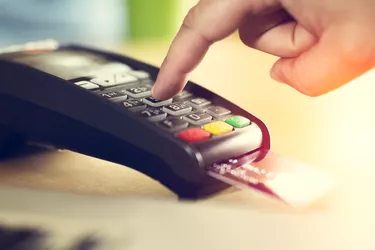Most people don't overdraw their bank accounts on purpose. You might think you have a few more dollars in there than you actually do, or maybe math was never your strong suit and you made a mistake when reconciling the account. Honest mistakes are more likely to result in aggravation than dire consequences. If you don't handle the situation responsibly, however, it can get worse.

Video of the Day
All Those Fees
An overdraft happens when transactions against your account — checks you've written or debits you've made — exceed your available balance. If the bank honors the debit or check so your account now shows a negative balance, this an overdraft. It's different from a nonsufficient-funds charge, which happens when the bank declines to pay your check or debit. Banks can charge multiple fees for these missteps, and this could be a costly nuisance.
Video of the Day
Act as Quickly as Possible
If you can make a deposit covering the overdraft amount and the fees, bringing your account back to a positive balance relatively quickly, this will probably be the end of an unpleasant incident. If you don't make a deposit, the bank will eventually close your account, but if you hold more than one account with the same bank, it's possible that it will just transfer money from one account to the other to cover the overdraft.
Your Credit Score May Take a Hit
If you don't cover the overdraft and just leave your account sitting with a negative balance, the bank may send the account to a collection agency. Most dealings between you and your bank won't appear on your credit report, but if the amount is in collections, this will probably show up and affect your score. Your overdraft might also appear on your credit report if the bank writes off your debt, such as if the amount of your overdraft is negligible and not worth the time and expense involved in trying to collect it. This may appear on your credit report as a "charge off," and this isn't good, either.
Banks Communicate With Databases
Even if your overdraft isn't reported to the credit bureaus, it may be reported to other banks, and this could prevent you from opening an account elsewhere. Banks regularly report to special databases that record only banking activity, not your whole credit profile. Your bank will probably report it if you overdraw your account and don't set things right.
The Bank Can Sue You
Anyone to whom you owe a debt can take you to court to try to collect it. The bank can sue you or, if it turns the matter over to a collection agency, the agency can sue. A lawsuit is a matter of public record, so if the court grants a judgment against you, this will also appear on your credit report. The judgment can be used to garnish your wages or to place liens against your property in an effort to collect the debt.
You Might Go to Jail
Intentionally writing a bad check is a crime — a felony in some states. But the bank would have to prove that you wrote the check with the intent of committing fraud and that you knew there were insufficient funds to cover the check. Even if you're not criminally charged with fraud, you can still be incarcerated in some states if the bank gets a judgment against you in civil court. If the judge orders you to make payments to satisfy the debt and you ignore the court's order, this is contempt of court and can result in jail time.